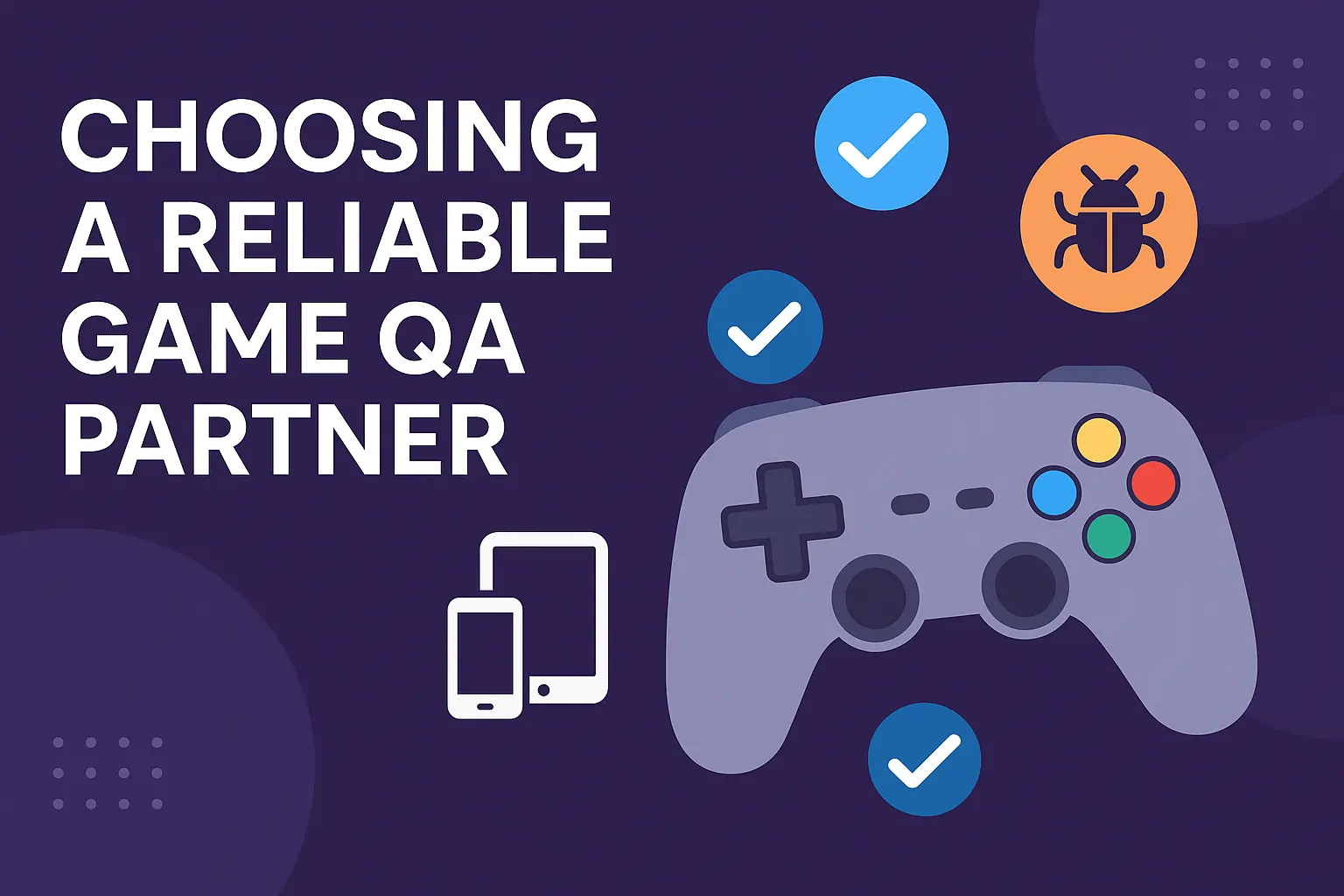What Game Testing Companies Expect from Game Developers.
Introduction
As the gaming industry continues to grow and innovate, providing an exceptional gaming experience has become increasingly critical. Game testing companies play a pivotal role in this ecosystem, serving as the guardians of quality assurance. With developers working tirelessly to craft immersive and captivating games, it is essential to grasp the complexities of game testing, particularly regarding costs and mutual expectations.
In this blog post, we will delve into the various elements that affect the costs associated with game testing, outline the diverse services offered by testing companies, and provide actionable advice for developers aiming to streamline the testing process. By fostering a strong partnership between developers and game testing companies, we can work together to create remarkable gaming experiences that engage and delight players around the globe.
The Role of Game Testing Companies
Game testing companies are dedicated to ensuring that games are not only functional but also enjoyable for players. Our mission encompasses a range of testing services designed to evaluate various aspects of game performance. Here’s a closer look at our primary offerings:
1. Functional Testing
Functional testing is the cornerstone of any game testing process. This testing method involves verifying that all game mechanics function as intended. Game testing companies meticulously check gameplay features, user controls, and overall functionality to ensure they align with the developers’ specifications. Key aspects include:
- Gameplay Mechanics: We ensure that the rules governing the game work smoothly, from character movements to special abilities.
- User Interface (UI) Testing: Our team evaluates menus, HUD (Heads-Up Display), and overall navigation to ensure a user-friendly experience.
- Interactive Elements: We rigorously test dialogues, cutscenes, and item interactions to confirm they work seamlessly.
Functional testing helps uncover critical bugs that could hinder gameplay, providing developers with peace of mind before launching their games.
2. Performance Testing
Performance testing is vital for determining how effectively a game functions under varying conditions. This type of testing is especially important for online multiplayer games, where server capabilities can greatly influence the overall user experience. Game testing companies concentrate on several key areas:
- Load Testing: This process involves simulating different player loads to assess how the game performs when numerous users are playing simultaneously. By understanding performance during peak usage, developers can better prepare for real-world scenarios.
- Stress Testing: Here, our team deliberately pushes the game to its limits to uncover potential weaknesses and identify points where the game may fail. This helps in recognizing maximum capacity and ensuring the game can handle unexpected surges in player numbers.
- Stability Testing: We evaluate how the game maintains its performance during prolonged gameplay sessions. Our goal is to ensure that the game remains responsive and crash-free, providing players with a seamless experience.
By analyzing these performance indicators, we equip developers with the insights necessary to enhance their games and reach a wider audience.
3. Usability Testing
Usability testing places the player’s experience at the forefront. This phase often involves real players who provide feedback based on their interactions with the game. Game testing companies emphasize:
- User Experience (UX): We assess whether players find the game engaging and enjoyable.
- Feedback Collection: Through surveys, interviews, and direct observation, we gather insights into player behavior.
- Interface Evaluation: We ensure that the UI meets player expectations and is easy to navigate.
Gathering feedback from actual players allows us to identify areas for improvement that may not be apparent through traditional testing methods.
4. Compatibility Testing
With the gaming landscape expanding to various platforms, compatibility testing has become essential. Game testing companies ensure that games function correctly across diverse devices, operating systems, and hardware. Key areas of focus include:
- Device Testing: We verify that the game performs well on consoles, PCs, and mobile devices.
- Operating System Compatibility: Our team ensures the game works seamlessly across different operating systems, such as Windows, macOS, Android, and iOS.
- Cross-Platform Functionality: We test multiplayer capabilities to ensure players can connect regardless of their platform.
By conducting thorough compatibility testing, game testing companies help developers reach a wider audience, enhancing overall player satisfaction.
Factors Influencing Game Testing Costs
For game developers, it’s essential to recognize the various factors that influence the costs associated with game testing. Being aware of these aspects can help in formulating a realistic budget. Here are some critical elements to consider:
1. Project Complexity
The overall complexity and size of a game significantly affect testing expenses. Projects that are more elaborate with advanced features typically necessitate a more detailed testing process. When assessing project complexity, developers should keep in mind the following considerations:
- Game Type: Different types of games have unique requirements for testing. For example, a strategy game might require more testing around AI behavior, while a sports game may focus on physics and player animations.
- Content Density: Games with numerous levels, characters, or storylines will naturally require more extensive testing efforts. Each individual component needs to be validated to ensure it functions correctly within the broader game environment.
- Platform Diversity: If a game is designed for various platforms—like consoles, PCs, and mobile devices—testing efforts will need to account for the differences in performance and user experience across these platforms. This can lead to additional costs as each platform must be thoroughly tested.
By understanding these factors, developers can more accurately predict the financial implications of testing their games and plan their resources effectively.
2. Testing Methodologies
Game testing can be approached through manual or automated methodologies, each with its pros and cons that can influence overall costs:
- Manual Testing: This method involves human testers who explore the game and report issues. While thorough, manual testing can be time-consuming and labor-intensive.
- Automated Testing: Using specialized software to conduct tests, automated testing can save time, especially for repetitive tasks. Although initial setup costs may be higher, the long-term savings can make this approach more cost-effective.
3. Geographical Location
The geographical location of the game testing company can also affect pricing. Companies based in regions with higher living costs may have different pricing structures than those in lower-cost areas. Considerations include:
- Labor Costs: Regions with higher wages will typically reflect those costs in their testing prices.
- Market Demand: Companies in high-demand areas may charge more due to increased competition and resource availability.
Pricing Models in Game Testing
As game testing companies, we offer various pricing models to accommodate developers’ diverse needs:
1. Hourly Rates
Many game testing companies charge by the hour, allowing developers flexibility in adjusting their testing requirements. Hourly rates can vary based on:
- Expertise: More experienced testers may command higher rates, reflecting their advanced skills.
- Service Type: Different testing services (e.g., functional vs. performance testing) may come with different hourly rates.
This model is beneficial for developers seeking targeted testing services tailored to specific phases of development.
2. Project-Based Pricing
Many game testing companies provide a fixed pricing model for comprehensive testing projects. This approach can be beneficial for developers seeking a predictable financial plan and clarity on the total costs involved in testing services. Several factors that can affect project-based pricing include:
- Extent of Testing Requirements: A more extensive range of testing services generally leads to higher costs. When a project demands thorough evaluations across multiple aspects of the game, the overall price will reflect this increased workload.
- Level of Complexity: Games that involve complex mechanics, intricate graphics, or advanced technology typically require more detailed testing. The need for in-depth analysis and additional resources can drive up the price for these projects.
By understanding these pricing dynamics, developers can better navigate their testing budgets and ensure they select the appropriate level of service for their needs.
What Game Developers Should Consider
To cultivate a successful partnership with game testing companies, developers should keep the following considerations in mind:
1. Quality vs. Cost
While it may be tempting to opt for the cheapest option, developers should carefully evaluate the balance between cost and quality. Investing in a reputable game testing company often leads to better long-term outcomes. A well-tested game is likely to perform better in the market and garner positive reviews, resulting in higher sales and player retention.
2. Long-term Investment
Thorough game testing can save developers money by preventing costly post-launch fixes and ensuring a smoother gaming experience. A game that launches with fewer bugs tends to receive better player feedback, ultimately boosting sales. Consider the following:
- Reputation Management: A poorly received game can damage a developer’s reputation and impact future projects.
- Customer Satisfaction: Delivering a polished product enhances player satisfaction and fosters loyalty among gamers.
3. Clear Communication
Open and effective communication between game developers and testing companies is essential for a successful partnership. We encourage discussions on several important topics:
- Objectives for Testing: Clearly express your goals for the testing process. Identify specific features or elements that require thorough examination, which helps us target our testing efforts more effectively.
- Project Deadlines: Inform us of your project timelines so that we can synchronize our testing activities with your schedule. Understanding your deadlines allows us to allocate resources efficiently and meet your expectations.
- Budget Parameters: Being transparent about your budget constraints is crucial. It enables us to adapt our testing services to fit your financial parameters while maintaining high-quality standards.
Additionally, sharing detailed insights about the game’s scope, intended audience, and desired user experience is vital. This context helps us craft a testing strategy that aligns seamlessly with your project’s goals and aspirations.
Additional Considerations
In addition to the primary testing services, developers should be aware of other factors that can impact their projects:
1. Post-Launch Support
Many game testing companies offer ongoing support after a game’s launch. This can include performance monitoring, updates, and testing for new content or expansions. Developers should consider including post-launch support in their budgets, as it can help address any issues that arise after launch and ensure a consistent player experience.
2. Licensing and Tools
Certain testing tools may require licensing fees, and the choice of tools can influence the testing process and overall costs. Developers should be prepared to discuss any specific tools they wish to incorporate into their testing strategy, as these may add to the project’s expenses.
Building a Successful Relationship
To ensure a fruitful collaboration between game testing companies and developers, consider the following best practices:
1. Set Clear Expectations
Clearly outline your goals, scope, and timeline for testing. This approach helps us deliver the best possible service while meeting your expectations. A shared understanding of project requirements streamlines the testing process, minimizing delays and miscommunication.
2. Be Open to Feedback
We often provide valuable insights based on our testing experience. Being receptive to our feedback can lead to improvements in gameplay and user experience. Consider incorporating our suggestions to enhance the final product.
3. Evaluate Testing Outcomes
After testing is complete, take the time to review our reports and recommendations. This process can help identify areas for improvement and inform future projects, ultimately contributing to the success of your games.
Conclusion
Understanding the complexities of game testing and setting clear expectations between developers and testing companies is essential for crafting exceptional gaming experiences. By recognizing the factors that impact testing costs, exploring the range of available services, and adopting effective collaboration techniques, developers can successfully navigate the testing landscape.
At Testers HUB, we are committed to providing bespoke game testing solutions that address the specific needs of each project. Our knowledgeable team is focused on ensuring your games achieve peak performance before their release. By collaborating with us, you can trust that your game will deliver the high-quality experience players desire. Together, let’s create the next remarkable title in the gaming world!











